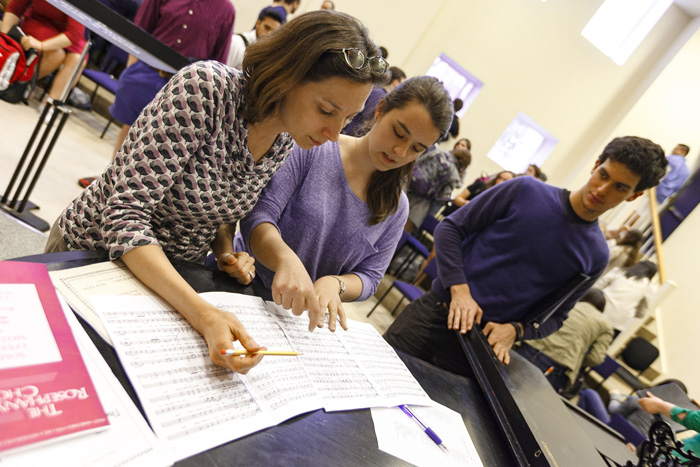Dickinson Professor Earns Coveted Guggenheim Fellowship

Scholar and educator Amy Wlodarski was awarded a 2024 Guggenheim Fellowship. Above, she works with choir members in 2016.
‘Visionary’ work focuses on Jewish WWII music history
by MaryAlice Bitts-Jackson
Professor of Music Amy Wlodarski will not soon forget the day she was announced as a Guggenheim Fellow. “I was so excited when I read the email, I think I let out a yelp,” she remembers. “My family came running, thinking something was wrong. And then we all just tumbled into a heap of laughter and tears.”
Awarded by the John Simon Guggenheim Memorial Foundation, the prestigious Guggenheim Fellowship supports exceptional work across a variety of disciplines. Past recipients include Nobel laureates and winners of the Pulitzer Prize, Fields Medal, Turing Award and National Book Award, among others.
Out of a pool of more than 3,000 candidates, 188 fellows were selected this year (that includes nanotechnology expert Chad Mirkin ’89; learn more about Mirkin’s superlative career). All of them, says foundation president Edward Hirsch, are “cultural visionaries” who are “meeting … challenges head-on and generating new possibilities and pathways across the broader culture.”
Naturally, Dickinson is proud to count a faculty member among them, says Renée Cramer, provost and dean, recognizing the many ways accomplished faculty enrich the community through high-quality scholarly work. “"It's an honor for Dickinson, and it's truly illustrative of the high quality of her scholarly work," Cramer says.
And the effects can be far-reaching, adds President John E. Jones III ’77, P’11. “Since assuming the presidency of our college I have been aware of Amy's unparalleled talents as a music scholar. Now, through the awarding of the prestigious Guggenheim Fellowship, the entire world knows about Amy and her impactful work at Dickinson. I am incredibly proud of her,” he says.
A leading voice
Wlodarski, a musicologist, will use Guggenheim Fellowship funding to support a book project examining the postwar historiography of Viktor Ullmann’s Der Kaiser von Atlantis (1943-44), a chamber opera written during the Holocaust in a Czechoslovakian ghetto.
Jewish music during and after World War II is personally meaningful to the professor, whose maternal grandmother was a forced laborer in World War II Germany. She’s been bringing fresh perspectives to this emerging discipline since she was a Ph.D. candidate at Eastman School of Music, theorizing on how music by German-Jewish composers contributed to philosophical conversations around trauma, history and the limits of Holocaust memory. A Presser Foundation Award and a Fulbright research fellowship to Germany provided access to key repositories and researchers abroad.
Since she joined Dickinson’s faculty in 2005, Wlodarski’s talents have not gone unnoticed. In 2022 she was named editor-in-chief of the Journal of the American Musicological Society, a flagship journal in her discipline.
Her first book, Musical Witness and Holocaust Representation (2015), garnered the American Musicology Society’s Lewis Lockwood Award. A second monograph, George Rochberg, American Composer: Personal Trauma and Artistic Creativity (2019), the first comprehensive study to trace the traumatic impact of World War II on Rochberg’s career, was selected for the NEH Fellowships Open Book Award and earned Wlodarski the Society for American Music’s H. Earle Johnson Subvention Award and the Book Prize from the Jewish Studies and Music Group of the American Musicological Society. Earlier recognitions include the 2012 Irving Lowens Award.
Wlodarski also contributed an essay to the award-winning volume Dislocated Memories: Jews, Music, and Postwar German Culture, which stemmed from a Dickinson-hosted conference on music and the Holocaust that Wlodarski organized in 2011.
Scholar, colleague, teacher
While Wlodarski’s scholarship alone merits the Guggenheim honor, she is also a dedicated educator and colleague, notes Neil Weissman, who worked closely with Wlodarski during his tenure as professor, provost and dean.
“She exemplifies Dickinson’s teacher-scholar model,” Weissman explains. “Her accomplishments as a researcher are matched by success in leading the College Choir (filling the very large shoes left by Truman Bullard) and in collaborating with colleagues to enrich and update the music department’s offerings for our students.”
Reflecting this, Wlodarski is a recipient of the Oral History Association’s Postsecondary Teaching Award (with Jeremy Ball and Kim Rogers) and Dickinson’s Distinguished Teaching Award and Ganoe Award for Inspirational Teaching.
In 2021, she was appointed Charles A. Dana Endowed Chair, and she currently directs the K. Robert Nilsson European Studies Center in Bologna, Italy.
Power of community
Wlodarski is quick to credit the programs and people who’ve helped make it all possible. That includes colleagues at Dickinson and across her field, former mentors and the granting agencies that have supported her research, including the National Endowment of the Humanities, Harvard University and the American Philosophical Society. The college’s sabbatical program and research funding, much of it supported by alumni, also allowed access to transnational archives.
Community support is vital as well, especially vital for a scholar constantly immersed in a traumatic subject.
“My family brings me joy and laughter, and that allows me the emotional support to approach witnesses and testimonial works fully open to often difficult truths,” she says, “and my students and colleagues have pushed me to think in new and innovative directions. They have shared expertise, insights and critiques, and I am a better scholar because of their generosity.”
TAKE THE NEXT STEPS
Published April 26, 2024